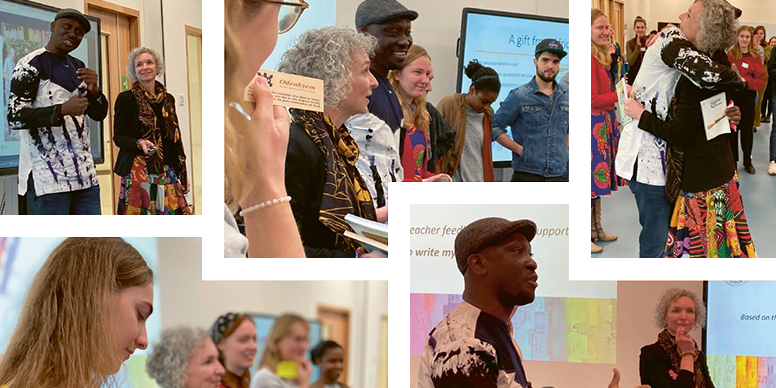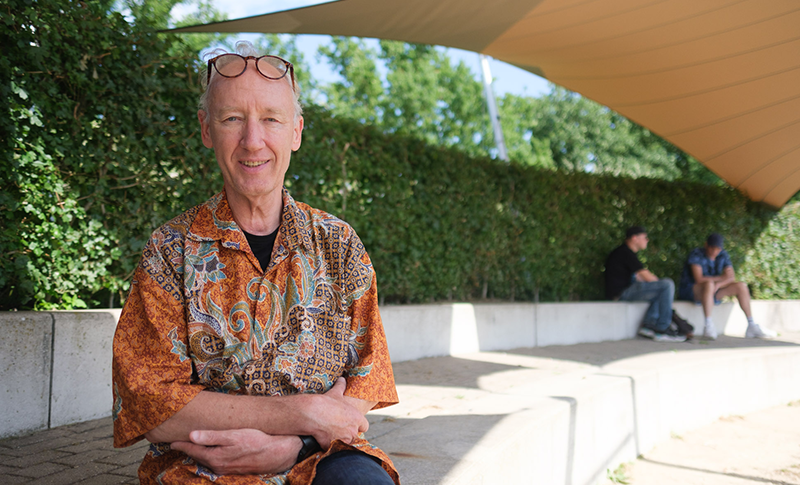‘As a teacher, Birgit does much more than terrific work. What she does is nothing less than a labour of love’. Of all the fine words students spoke about Teacher of the Year Birgit Boogaard, these were perhaps the most touching. Resource sat in on the final lecture of her now famous African Philosophy course – and felt that love too.
When Boogaard was honoured with the accolade Teacher of the Year earlier this academic year, she praised her students ‘for their courage to be open to critical self-reflection and to other worldviews’. She also revealed that she saw the award as a token of appreciation ‘for her creative and liberating teaching methods’. Intriguing words, so Resource dropped in on the last lecture of African Philosophy, one of Boogaard’s most important courses.
At the start of the class, the 70-odd chairs are still neatly facing the screen while African pop music comes out of the speakers. ‘From a playlist that the students and the teaching team constantly add to during the course,’ Boogaard explains. Not just because of the fun of exchanging music tips, but also to underline that African philosophy is not primarily about written sources. ‘In this field, oral and musical traditions are at least as influential,’ she clarifies. So there’s the first creative teaching method for Resource to tick on the list: making playlists together.
Different view
This is the fifth time Boogaard has taught this course. So it’s an anniversary edition, but one she was a bit nervous about beforehand. Because, with the news spreading around the campus that African Philosophy was a great course, Boogaard suddenly no longer had a manageable 30 to 35 students to teach, but double that number – and from as many as 26 different degree programmes.
Actually, everyone at WUR should take this course
With such a large group, can she still create the right, intimate setting for the sometimes life-changing personal reflections that make the course so special?
Yes she can, from what Resource sees at this final lecture – and that is confirmed wholeheartedly by the students. ‘My worldview has changed quite a bit because of this course,’ says Master’s student of Organic Agriculture Myriam de Vroome. ‘In part, that has to do with the subject matter. But it definitely also has to do with Birgit’s way of doing things. She puts a lot of emotion into her teaching. As does Pius.’
Co-teacher Pius Mosima is a lecturer in intercultural philosophy at the University of Bamenda (Cameroon) and is regularly in the Netherlands because of his close research ties with VU University Amsterdam, among others. And above all, he has known Boogaard for years. He can articulate African perspectives in unforgettable ways. During this class, for instance, he repeatedly emphasizes that knowledge and wisdom are more than your right brain. ‘Bodies too “know” certain things. Don’t underestimate what your body has to tell you,’ he tells the students.
Talking with your feet
Boogaard brings that physicality into play later too, with an evaluation in which the chairs are pushed aside and students talk with their feet. This is how it works: Boogaard makes statements and the students express their responses through the direction they move in – and unconsciously also through the way they move: a decisive stride tells a different story than a few hesitant steps. Boogaard observes, occasionally asks for an explanation, and draws parallels with the material, together with Mosima. ‘No, an elder does not necessarily have the last word. Their main task is to inspire new thoughts and insights within a group. Which is exactly what Birgit does,’ says Mosima in response to a question about the dynamics of African decision-making.
Thought frames
There are quite a few nice asides like that between Boogaard and Mosima. The students enjoy their interaction immensely, as becomes clear when Boogaard deals with questions and feedback about the course content.
Birgit puts a lot of emotion into her teaching
One of the questions submitted reads: do Birgit and Pius ever disagree on anything? Besides a roar of laughter, this gets a perfectly serious answer: yes, indeed they do – on a semantic issue related to modern African history, for example. Boogaard and Mosima disagree on whether the word ‘decolonization’ is more apt, or the word ‘liberation’. No trivial matter, philosophically, they stress, because word choices define thought frames.
Understanding what you’re looking at
In this last class, Boogaard hands the students an A3 sheet with a large illustration, as a kind of visual summary of the past six weeks. She made and animated the illustration herself, to help her switch easily between details and the bigger picture during classes, without students losing the thread. ‘If there’s something in the illustration that you can’t place, you should pipe up now,’ Boogaard warns. No need, the students quite understand what they are looking at: six weeks of African Philosophy summed up in one slide. From the history and trends in African philosophy and a wake-up call about an overly Eurocentric view in the first classes, to an exploration of Ubuntu and the ethical principle of Motho ke motho ka batho (= a human being is a human being thanks to other people) in the later sessions. Just the final assignment to go, and the course is over.
Remarkably, although the language of instruction is English, Boogaard asks the students to write a part of the final assignment in their mother tongue. ‘In no language do you formulate things as precisely as the language you grew up with. And accuracy is important in a philosophical essay and for learning to understand your own background and thought frames,’ says Boogaard by way of clarification.
Eyes opened
Boogaard winds up the class by taking the time to look back at the hopes and expectations with which the students started this course six weeks earlier. She is showered with compliments. Almost every student praises the new perspectives on the world and the different view of yourself kindled by this course – ‘actually, everyone at WUR should take it’. Finally, Boogaard expresses her gratitude to her African co-lecturer and guest lecturers, who included leading South African philosopher Mogobe Ramose (‘a dream come true’). And she doesn’t forget her students. They finish up by listening to one last piece of music: Sawubona, ‘I see you’. Students and teachers say goodbye and embrace each other warmly. Mosima has the last word: ‘Spiritually we will stay connected.’
Teaching methodology
‘Extremely well prepared, but not in the way you might expect,’ says co-teacher Pius Mosima about Boogaard’s unusual teaching approach. Asked about this, Boogaard shows a plan outlining for each lecture precisely when she uses which exercises and techniques to work towards which learning objective. ‘Students don’t notice it, but these classes are orchestrated almost to the minute,’ she agrees. Up to 50 per cent of her course preparation consists of designing the learning process, she reckons. ‘That is quite different from what is common in academic teaching, with 80 per cent of the planning going into the content.’ In her classes, the Teacher of the Year makes extensive use of so-called Liberating Structures, a series of working methods that maximize the potential of a group by making every group member feel welcome to contribute freely. ‘For the teacher, that provides you with very good, instructive questions, because everyone is thinking along. Another plus is that it creates a safe learning environment, so that no one is afraid to reflect critically – even on themselves. That leads to wonderful, extraordinary group discussions in which opinions really differ, but in which everyone treats each other with absolute respect.’ You can read more about this at liberatingstructures.com.

 Teacher of the Year Birgit Bogaard (top right) and co-teacher Pius Mosima (top left) with students during the final lecture of the African Philosophy course. Photo’s Marieke Enter
Teacher of the Year Birgit Bogaard (top right) and co-teacher Pius Mosima (top left) with students during the final lecture of the African Philosophy course. Photo’s Marieke Enter 

